
Unlike high blood pressure (hypertension), low blood pressure or hypotension isn’t generally considered to be a problem.
According to the American Heart Association guidelines, normal blood pressure is a reading of less than 120/80 mmHg—and there’s no specific reading that goes on to distinctly define low blood pressure. In fact, many people—myself included—regularly have blood pressure readings as low as 90/60 mmHg without any issues.
In fact, doctors usually don’t treat chronically low blood pressure unless a person is having problematic symptoms.
What Are the Symptoms of Low Blood Pressure?
Symptoms of low blood pressure include:
- Feeling dizzy or lightheaded
- Nausea
- Fainting
- Fatigue
- Blurred vision
- Cold, clammy, pale skin
- Depression
- Rapid, shallow breathing
- Dehydration and unusual thirst
What Causes Low Blood Pressure?
There are several common causes of low blood pressure, some of which are situational and temporary, while others are chronic and may warrant further investigation. Here are some of the most common causes of low blood pressure:
- Heart Issues: A very low heart rate, problems with your heart valves, and heart failure can all contribute to low blood pressure. So, if your blood pressure is too low it’s important to get a complete cardiac workup.
- Postural (Orthostatic) Hypotension: This is a type of low blood pressure that is brought on by a change in posture, such as when you get up out of bed after you have been lying down or even simply standing up after sitting. Usually, the drop in blood pressure returns to a normal reading fairly quickly. Postural hypotension becomes more common with age and can also be caused by blood pressure-lowering medications.
- Low Blood Pressure Following a Meal: For some people, especially as they age, blood pressure can drop following a meal. That’s because your intestines need more blood to help with digestion, which exerts pressure on your heart and blood vessels to supply that blood. This type of low blood pressure can also happen for people with Parkinson’s disease and diabetes.
- Medication Side Effects: Some heart medications and antidepressants can cause a drop in blood pressure. If you’re experiencing symptoms of low blood pressure, check you’re your doctor or pharmacist to make sure you’re not taking medications that are contributing to the issue.
- A Lack of B Vitamins: If you’re not taking enough folate and vitamin B12, your body may be anemic, meaning it’s not creating enough red blood cells which can cause low blood pressure.
What to Do If You Have Low Blood Pressure
If you have a sudden drop in blood pressure, you want to seek medical care immediately. If your blood pressure is low and you’re experiencing symptoms of low blood pressure, visit your doctor to get to the source of what’s causing the issue.
Plus, Here’s a Tip: For some people who have low blood pressure with mild symptoms of lightheadedness, using a sprinkle of sea salt or Himalayan sea salt on food for taste may help to create volume expansion, which can help to raise low blood pressure. But consult with your doctor first.


